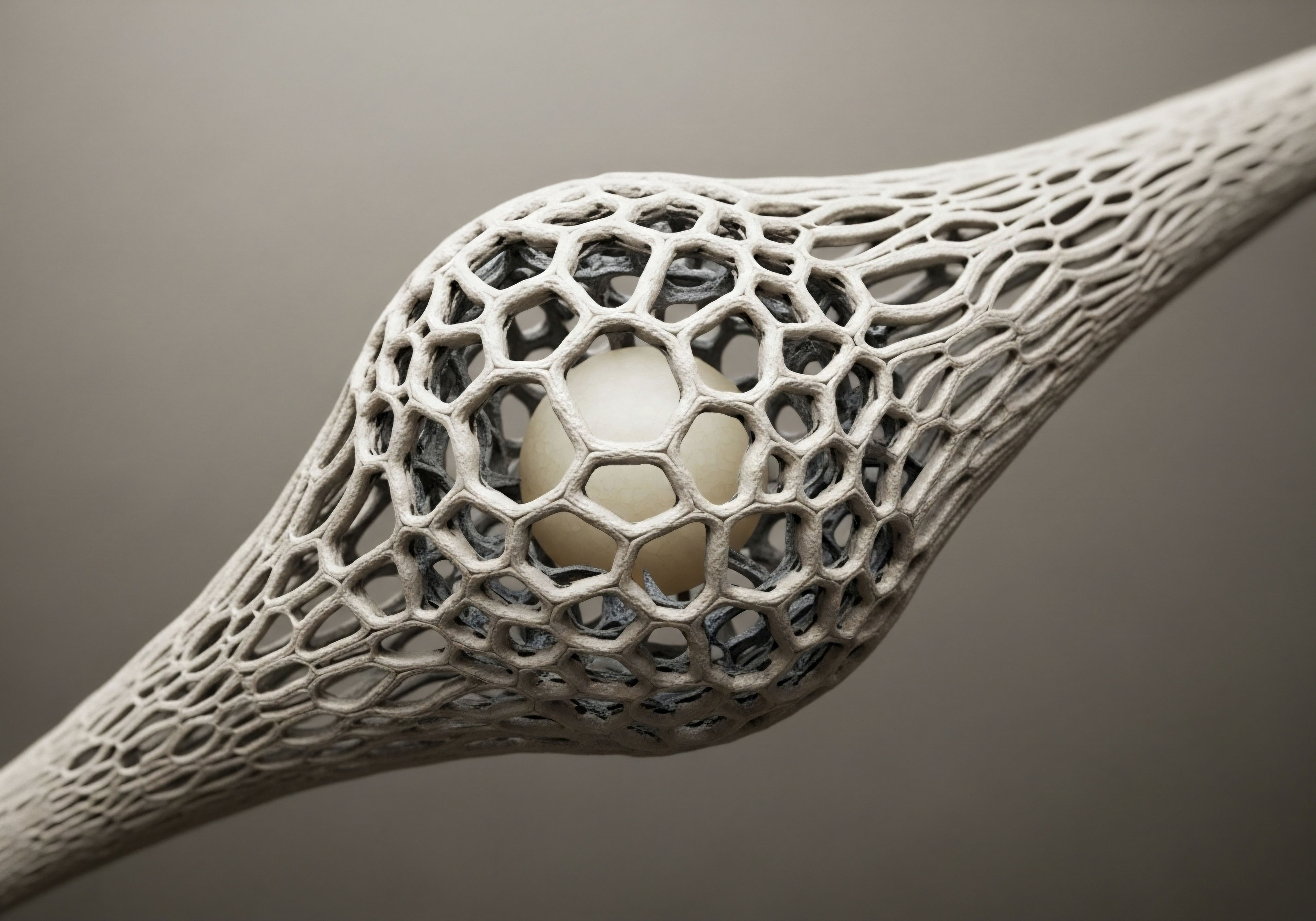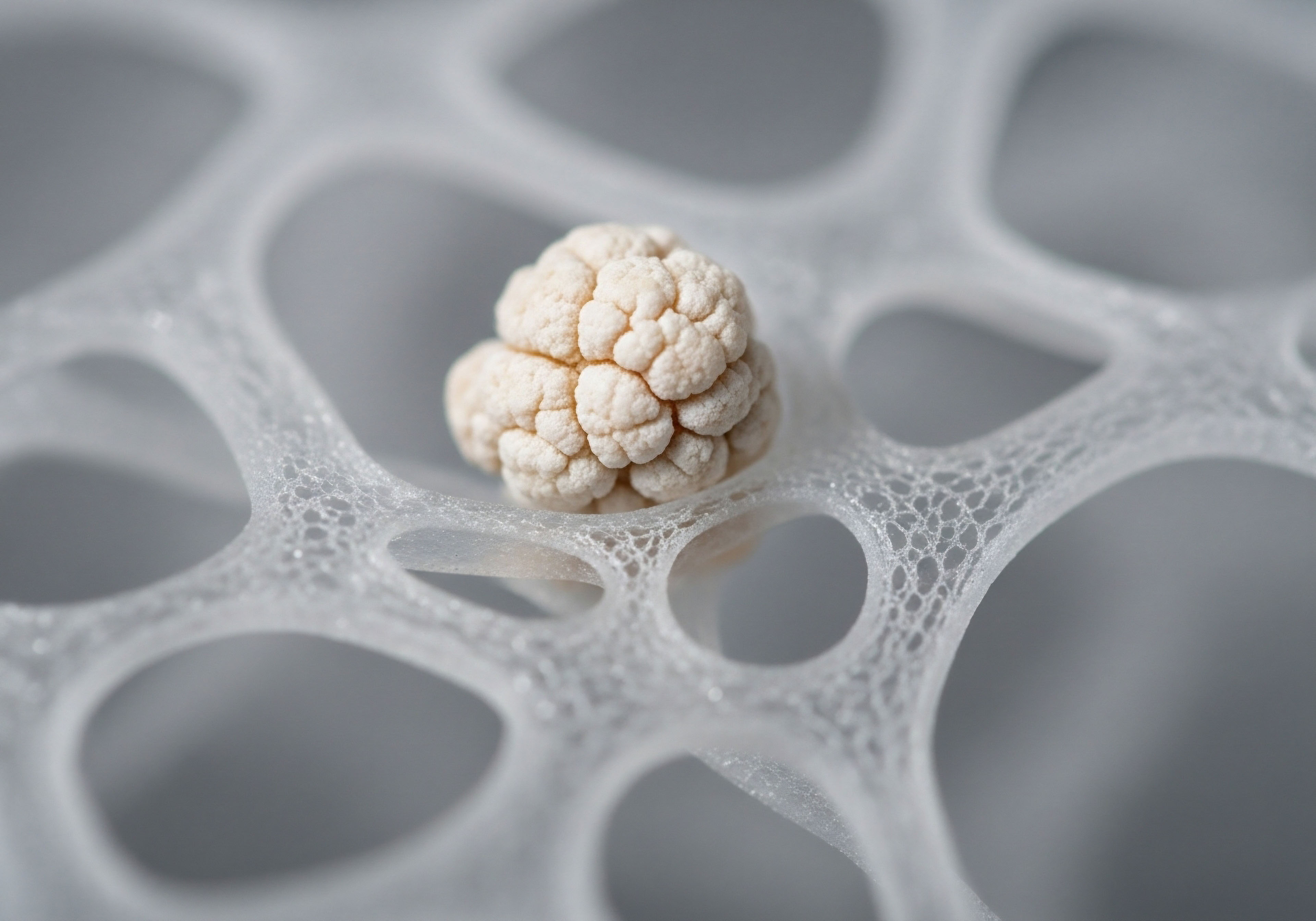

Fundamentals
The question of how quickly you can expect wellness improvements from hormonal optimization protocols is a deeply personal one. It arises from a place of profound disconnect, a feeling that the person you are on the inside is no longer reflected in your daily energy, your mental clarity, or your physical vitality.
You are seeking a return to a state of function that feels familiar, a recalibration of your internal world. The timeline for this process is best understood as a sequence of biological systems coming back online, a gradual reawakening orchestrated by the restoration of your body’s primary chemical messengers.
Your endocrine system is a sophisticated communication network. Hormones are the data packets, the specific instructions sent from central command centers like the pituitary gland to every cell, tissue, and organ. When these signals become weak or distorted, as they do during andropause or the menopausal transition, the entire system begins to operate with incomplete information.
Fatigue, cognitive fog, emotional lability, and a loss of physical capacity are the direct, tangible results of this communication breakdown. The initiation of a personalized hormone support protocol is the first step in restoring the integrity of these signals.
The initial phase of hormonal therapy focuses on re-establishing a foundational biochemical stability, with subjective feelings of well-being often preceding measurable physical changes.
The first changes are often subtle, felt more than seen. Within the first one to four weeks, many individuals report a noticeable shift in their foundational state of being. Sleep may deepen, allowing for more restorative rest. This improvement in sleep quality has a cascading effect, directly influencing daytime energy levels and mental stamina.
A sense of enhanced alertness and a lifting of the persistent mental cloudiness are common early reports. For men on testosterone replacement therapy (TRT), this period often brings a renewed sense of vigor and motivation. For women undergoing hormonal therapy for perimenopausal symptoms, the initial weeks can bring a welcome reduction in the frequency and intensity of hot flashes and night sweats, leading to immediate improvements in comfort and sleep.
This initial phase is about re-establishing equilibrium. Your body is responding to the reintroduction of clear, consistent hormonal signals. Think of it as a complex orchestra that has been playing out of tune. The therapy does not introduce a new instrument; it provides the conductor with a clear score once again, allowing the existing sections to play their part correctly.
The improvements in mood, a reduction in irritability or anxiety, and an enhanced sense of overall well-being are direct consequences of your neurological and metabolic systems receiving the clear instructions they have been missing.

Understanding Your Unique Timeline
It is important to frame your expectations around the concept of bio-individuality. The timeline for improvement is not a rigid schedule but a dynamic process influenced by several factors. Your starting hormone levels, the specific protocol prescribed by your clinician, your genetic predispositions, and your overall metabolic health all contribute to the pace of your progress. Lifestyle components, including nutrition, physical activity, and stress management, are also powerful modulators of your endocrine system and will significantly influence your outcomes.
A person with severely deficient testosterone levels may experience more dramatic initial improvements than someone with levels at the lower end of the normal range. Similarly, the choice of delivery method, whether it is weekly injections, transdermal creams, or long-acting pellets, will affect the pharmacokinetics of the therapy, influencing how quickly a steady state of the hormone is achieved in your bloodstream.
Your clinical team will consider these variables when designing your protocol and will monitor your progress closely, making adjustments to ensure your body is responding optimally. The journey is a collaborative one, a partnership between you, your clinician, and your own biology.


Intermediate
Moving beyond the initial phase of wellness improvements requires a more detailed understanding of the clinical protocols themselves. The specific agents used in your therapy are chosen for their precise interactions with your endocrine system. The timeline of benefits is a direct reflection of how these protocols systematically restore function to various biological pathways. Examining the mechanics of these therapies reveals a deliberate, multi-layered strategy for comprehensive biochemical recalibration.

Male Hormonal Optimization Protocols
For men undergoing Testosterone Replacement Therapy (TRT), the protocol is designed to do more than simply elevate testosterone levels. It is a comprehensive approach to re-establishing the proper function of the entire Hypothalamic-Pituitary-Gonadal (HPG) axis. The standard protocol often involves a synergistic combination of medications.

The Core Components and Their Functions
A typical male protocol includes several key elements working in concert. Testosterone Cypionate, administered via weekly intramuscular or subcutaneous injections, serves as the foundational element, providing a steady level of exogenous testosterone. This restores the primary androgenic and anabolic signals that govern everything from libido and mood to muscle protein synthesis and red blood cell production. The timeline of its effects is well-documented.
Concurrently, a medication like Gonadorelin is often prescribed. Gonadorelin is a GnRH (Gonadotropin-Releasing Hormone) analog. Its purpose is to directly stimulate the pituitary gland, encouraging the continued production of Luteinizing Hormone (LH) and Follicle-Stimulating Hormone (FSH). This is a critical component for maintaining testicular volume and endogenous hormonal function, preventing the shutdown of the natural signaling pathway that can occur with testosterone therapy alone.
Finally, an aromatase inhibitor such as Anastrozole may be included. As testosterone levels rise, a portion of it naturally converts to estradiol via the aromatase enzyme. While some estrogen is essential for male health, excessive levels can lead to unwanted side effects. Anastrozole blocks this conversion process, allowing for precise control over the testosterone-to-estrogen ratio, a key factor in optimizing outcomes and well-being.
A well-designed TRT protocol for men is a dynamic system, balancing exogenous hormone administration with support for the body’s natural signaling pathways.

Projected Timeline of TRT Effects
The following table outlines a general timeline for the physiological and psychological benefits of a comprehensive male TRT protocol. The ranges reflect the principle of bio-individuality.
| Timeframe | Primary Physiological and Psychological Improvements |
|---|---|
| Weeks 1-4 |
Initial increases in energy levels and reduction in fatigue. Noticeable improvements in sleep quality and duration. Early enhancements in libido and sexual interest begin to manifest. |
| Weeks 4-8 |
Mood stabilization becomes more pronounced, with reductions in irritability and symptoms of depression. Mental clarity and focus improve. Libido and sexual satisfaction continue to increase, plateauing around week six. |
| Months 3-6 |
Significant changes in body composition become apparent. This includes an increase in lean muscle mass due to enhanced protein synthesis and a decrease in visceral body fat. Improvements in insulin sensitivity can be measured. Initial positive effects on bone mineral density begin. |
| Months 6-12+ |
Full benefits on muscle strength and physical capacity are realized. Bone density improvements become more significant. Many men report a sustained high quality of life, stable mood, and optimized cognitive function. Long-term cardiovascular markers may show improvement. |

How Do Specific Protocols Influence the Timeline?
The timeline for wellness improvements in women undergoing hormonal therapy is profoundly influenced by their menopausal status and the specific symptoms being addressed. The goal is to restore hormonal balance in a way that alleviates discomfort and enhances quality of life, using the lowest effective doses.

Protocols for Perimenopause and Postmenopause
For women, protocols are highly personalized. They may include estradiol for vasomotor symptoms, progesterone to protect the uterus and support mood, and in many cases, low-dose testosterone to address concerns like low libido, fatigue, and cognitive fog.
- Estradiol Therapy ∞ Delivered via patches, gels, or pills, this is the most effective treatment for relieving hot flashes, night sweats, and vaginal dryness. Improvements in these areas can be felt within a few weeks, dramatically impacting sleep and overall comfort.
- Progesterone ∞ For women with a uterus, progesterone is essential to balance estrogen and prevent endometrial hyperplasia. It also has its own benefits, often improving sleep quality and providing a calming effect on the nervous system. This is typically taken orally or as a cream.
- Testosterone Therapy for Women ∞ A growing body of evidence supports the use of low-dose Testosterone Cypionate (typically 10-20 units weekly) or pellet therapy for women. The primary targets are improvements in sexual desire, energy levels, muscle tone, and mental sharpness. The timeline for these benefits mirrors that in men, albeit on a different scale, with initial improvements in energy and libido often reported within the first month.

The Role of Growth Hormone Peptide Therapy
Peptide therapies represent another frontier in personalized wellness, often used in conjunction with or as an alternative to traditional HRT. These protocols use specific peptide chains to stimulate the body’s own production of growth hormone.

CJC-1295 and Ipamorelin Synergy
A common and effective combination is CJC-1295 and Ipamorelin. These two peptides work on the pituitary gland through different, complementary mechanisms to create a powerful, natural release of Human Growth Hormone (HGH).
- CJC-1295 ∞ This is a long-acting Growth Hormone Releasing Hormone (GHRH) analog. It provides a slow, steady signal to the pituitary, elevating baseline HGH levels for an extended period, sometimes for days after administration.
- Ipamorelin ∞ This is a Growth Hormone Secretagogue (GHS) that mimics the hormone ghrelin. It causes a strong, clean, and rapid pulse of HGH release without significantly affecting other hormones like cortisol.
When used together, this combination provides both a sustained elevation and sharp peaks of HGH release, mimicking the body’s natural youthful patterns. Users often report improvements in sleep quality and recovery within the first few weeks. Over a period of 3 to 6 months, the benefits extend to enhanced fat metabolism, increased lean muscle mass, improved skin elasticity, and faster recovery from exercise and injuries.


Academic
A sophisticated analysis of the timeline for wellness improvements from hormonal therapies requires a systems-biology perspective. The subjective experiences of increased energy, mental clarity, and physical capacity are the macroscopic manifestations of complex changes occurring at the cellular and systemic levels.
The central regulator of many of these processes is the Hypothalamic-Pituitary-Gonadal (HPG) axis, a finely tuned neuroendocrine feedback loop. The effectiveness and timeline of hormonal interventions are direct functions of how they interact with and modulate this critical axis.

The HPG Axis as the Central Endocrine Regulator
The HPG axis is an elegant, self-regulating circuit. The hypothalamus secretes Gonadotropin-Releasing Hormone (GnRH) in a pulsatile manner. This signal travels to the anterior pituitary gland, stimulating the release of Luteinizing Hormone (LH) and Follicle-Stimulating Hormone (FSH).
These gonadotropins, in turn, act on the gonads (testes in men, ovaries in women) to stimulate the synthesis and secretion of sex steroids, primarily testosterone and estradiol. These end-product hormones then exert negative feedback on both the hypothalamus and the pituitary, suppressing GnRH, LH, and FSH release to maintain systemic homeostasis. Age-related hormonal decline is characterized by a progressive dysregulation of this axis, either through reduced gonadal output or altered central sensitivity to feedback.

What Are the Systemic Effects on the HPG Axis?
Pharmacological interventions are designed to precisely modulate this axis at different points. The timeline of their effects corresponds to the restoration of signaling at the target tissues.

Exogenous and Endogenous Modulation in TRT
The administration of exogenous Testosterone Cypionate directly elevates serum testosterone levels, bypassing a potentially failing gonadal production system. This provides immediate substrate for androgen receptors throughout the body, explaining the rapid onset of improvements in libido and energy within the first few weeks.
This action, however, also enhances the negative feedback on the hypothalamus and pituitary, suppressing endogenous LH and FSH production. This is the biological rationale for including Gonadorelin in a comprehensive protocol. As a GnRH analog, Gonadorelin provides a direct, stimulatory input to the pituitary, preserving the signaling pathway and maintaining testicular responsiveness and steroidogenesis. This dual approach supports both systemic hormonal levels and the health of the endogenous production machinery.
Anastrozole, an aromatase inhibitor, adds another layer of control. By modulating the conversion of testosterone to estradiol, it allows for the fine-tuning of the androgen-to-estrogen ratio. This is critical because estradiol itself is a potent mediator of negative feedback on the HPG axis. Controlling its levels helps to maintain a more robust endogenous signaling environment while optimizing the clinical effects of testosterone.

Interactions with the Hypothalamic-Pituitary-Somatotropic (HPS) Axis
Peptide therapies, such as the combination of CJC-1295 and Ipamorelin, interact with a parallel system ∞ the HPS axis, which governs growth hormone secretion. CJC-1295, a GHRH analog, stimulates the same hypothalamic-pituitary cascade, but its target is the release of Growth Hormone (GH).
Ipamorelin, a ghrelin mimetic, acts on a separate receptor in the pituitary, also triggering GH release. The synergistic effect of these two peptides creates a robust GH pulse that influences nearly every cell in the body.
The timeline of peptide therapy benefits, such as improved body composition and tissue repair, is tied to the downstream effects of GH, primarily mediated by Insulin-Like Growth Factor 1 (IGF-1), which is produced in the liver in response to GH stimulation. The improvements in sleep quality are linked to GH’s role in regulating sleep architecture.
The varying timelines of hormonal and peptide therapies are explained by their distinct points of intervention within the body’s intricate neuroendocrine axes.
The following table provides a comparative analysis of the mechanisms of action for key therapeutic agents used in hormonal optimization protocols.
| Therapeutic Agent | Primary Mechanism of Action | Target System | Primary Downstream Effect |
|---|---|---|---|
| Testosterone Cypionate |
Directly activates androgen receptors throughout the body. |
Systemic (Muscles, Bones, Brain, etc.) |
Restoration of androgenic and anabolic signaling. |
| Gonadorelin |
Acts as a GnRH analog to stimulate the pituitary gland. |
Hypothalamic-Pituitary-Gonadal Axis |
Increased endogenous production of LH and FSH. |
| Anastrozole |
Inhibits the aromatase enzyme, blocking the conversion of testosterone to estradiol. |
Systemic (Adipose Tissue, etc.) |
Modulation of the testosterone-to-estradiol ratio. |
| Progesterone |
Activates progesterone receptors, balancing the effects of estrogen. |
Uterus, Central Nervous System |
Endometrial protection and neuro-calming effects. |
| CJC-1295 |
Long-acting GHRH analog that stimulates the pituitary gland. |
Sustained elevation of Growth Hormone levels. |
|
| Ipamorelin |
Ghrelin mimetic (GHS) that stimulates the pituitary gland. |
Hypothalamic-Pituitary-Somatotropic Axis |
Pulsatile, sharp release of Growth Hormone. |
Ultimately, the timeline of wellness improvements is a reflection of a multi-system restoration. Initial benefits in mood and energy are driven by the direct action of hormones on the central nervous system.
The subsequent changes in body composition, strength, and overall vitality are the result of these hormones orchestrating widespread changes in gene expression, protein synthesis, and metabolic function over weeks and months. A comprehensive understanding of these interconnected axes is fundamental to appreciating the profound and progressive nature of hormonal optimization.

References
- Saad, F. Aversa, A. Isidori, A. M. & Zafalon, L. (2011). Onset of effects of testosterone treatment and time span until maximum effects are achieved. European Journal of Endocrinology, 165(5), 675 ∞ 685.
- Walther, A. Breidenstein, J. & Miller, R. (2019). Association of Testosterone Treatment With Alleviation of Depressive Symptoms in Men ∞ A Systematic Review and Meta-analysis. JAMA Internal Medicine, 179(1), 39 ∞ 51.
- Snyder, P. J. Bhasin, S. Cunningham, G. R. Matsumoto, A. M. Stephens-Shields, A. J. Cauley, J. A. & Ellenberg, S. S. (2016). Effects of testosterone treatment in older men. New England Journal of Medicine, 374(7), 611-624.
- Stuenkel, C. A. Davis, S. R. Gompel, A. Lumsden, M. A. Murad, M. H. Pinkerton, J. V. & Santen, R. J. (2015). Treatment of symptoms of the menopause ∞ an Endocrine Society clinical practice guideline. The Journal of Clinical Endocrinology & Metabolism, 100(11), 3975-4011.
- Teichman, S. L. Neale, A. Lawrence, B. Gagnon, C. Castaigne, J. P. & Frohman, L. A. (2006). Prolonged stimulation of growth hormone (GH) and insulin-like growth factor I secretion by CJC-1295, a long-acting analog of GH-releasing hormone, in healthy adults. The Journal of Clinical Endocrinology & Metabolism, 91(3), 799-805.
- Laferrère, B. Abraham, C. Russell, C. D. & Yndestad, A. (2008). Growth hormone releasing peptide-2 (GHRP-2), like ghrelin, increases food intake in healthy men. The Journal of Clinical Endocrinology & Metabolism, 93(2), 447-452.
- The North American Menopause Society. (2022). The 2022 Hormone Therapy Position Statement of The North American Menopause Society. Menopause, 29(7), 767-794.

Reflection
You began this inquiry seeking a timeline, a map to a future state of well-being. The data and mechanisms outlined here provide the coordinates and the landmarks for that map. Yet, the most profound part of this process is the shift from being a passenger in your own biology to becoming an active partner in its stewardship.
Understanding the ‘why’ behind your protocol, the intricate dance of signals being restored within your body, transforms the experience. It moves from a passive waiting for results into a proactive engagement with your own health. This knowledge is your foundational tool.
The path forward involves listening to your body’s feedback, communicating with your clinical team, and recognizing that you are recalibrating a system of immense complexity and intelligence. The ultimate goal is a state of function where your inner vitality is fully expressed in your daily life.



